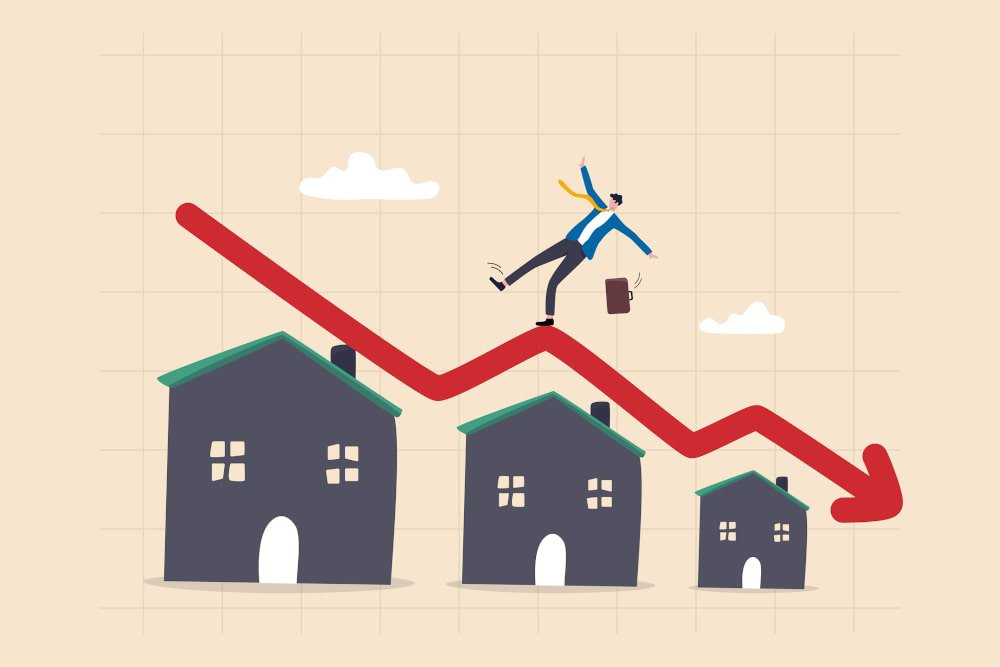Will the House Market Ever Crash in Canada?

Will the Canadian housing market crash in the near future? With soaring prices and growing uncertainties, homeowners and buyers are anxious about potential corrections in the market.
Key Takeaways:
- Rising interest rates, household debt, and overvaluation of homes may signal a potential crash.
- Factors like government intervention, strong immigration demand, and limited housing supply contribute to market stability.
- Experts predict price corrections in certain areas, but not a full-blown market crash.
With this unparalleled growth, will the Canadian housing market crash? The Canadian housing market has experienced unprecedented levels of growth; homeowners and buyers alike are questioning what will happen over the next year. Driven by interest rates, government policies, population growth, and global economic trends, there are a number of factors that evaluate the question at large. In this guide, we will explore the indicators of a potential market crash, the current market stability factors, and long-term predictions for the Canadian housing market .
What Are the Indicators of a Canadian Housing Market Crash?
Generally speaking, any kind of collapse in housing markets is due to a collapse of confidence, brought on by various economic factors, which ultimately precipitates gross imbalance between demand and supply. There are a number of factors that could indicate the possibility of a market crash in the Canadian housing market.
- Interest Rates : One of the key determinants of real estate markets are interest rates. With each increase which the Bank of Canada announces, keeping inflation at bay, the cost of borrowing goes up, eating into home buyers' purchasing power. The current interest rate sits at 4.25%, down 0.25bps from last month . In the early years of the 1980s , a severe recession depressed housing markets in Canada. At a time when interest rates topped 20%, they bit deep into affordability, and accordingly, prices fell with purchaser activity at a reduced level. Real estate demand has been quite strong over the past decade due partly to low interest rates. However, interest rates are rising, likely leading to fewer buyers in the market and a correction in housing prices.
- Household Debt Levels: Canada has the highest levels of household debt among advanced economies worldwide. In one report, the Bank of Canada indicated that an average debt held by a Canadian household against its disposable income is around 170%. Paying such debts will be more expensive with rising interest rates, which may lead to a higher rate of defaults on mortgages and other loans, hence adding chaos to the housing market.
- Overvaluation of Homes: The International Monetary Fund (IMF) has over time pointed out that Canadian housing is overvalued , namely in Toronto and Vancouver , given that house price increases have outpaced growth in the average income of a Canadian in the area. In 2023, the average house in Canada costs about $730,000, and to a vast majority of Canadians, that is out of their reach. The average house prices in Toronto and Vancouver top $1.2 million , outpacing the growth of average income from all over the nation. If this continues further unchecked by unsustainable growth in prices, it is probable that this could lead to a bubble which may burst when demand gets low.
- Global Economic Shocks: Instability in the world's economy may foreshadow a recession or financial crisis that could bring adverse effects on the Canadian housing market. The Canadian economy is comparatively susceptible to global economic downturns because of its relative smallness as an open economy and reliance on commodities such as oil, which are quite volatile. An economic shock could lead to a plunge in consumer spending and a noticeable slowdown in real estate investment.
What Current Market Stability Factors Are in Play?
Despite the concerns of a potential crash, there are also several factors contributing to the stability of the Canadian housing market.
- Government Intervention: In terms of government intervention, the Canadian government has made an attempt to cool the inflated market through a policy that institutes a foreign buyer's tax, stress tests for mortgage approval , and a ban on speculative short-term investments. This has cooled the housing prices, especially in markets like Vancouver, whose demand had been driven by foreign investment.
- Strong Demand for Housing: Immigration is one of the major factors driving the Canadian property market. International residents are looking towards Toronto, Vancouver, and many other major cities, pushing up housing demand. In particular, Canada is already limited in its housing supply , with estimates indicating an additional 3.5 million homes needed by 2030 to meet both domestic demand. Recently, the government has promulgated tighter policies toward international students and foreign workers. But Canada is still attractive to immigrants, and this demand may drive up home prices continuously.
- Limited Housing Supply: Geographical confines mean that cities like Vancouver can free up only so much land for new housing. Where demand outstrips supply in desirable urban areas, the low supply of places pushes the price upwards. Even a city such as Toronto, which is less landlocked, also has its challenges of supply to an increasingly growing population.
- Economic Growth and Employment: As of now, the Canadian economy has shown relative strength, with low unemployment and a job market with expanding abilities. In 2017, both Toronto and Vancouver corrected following the imposition of both foreign buyer taxes and mortgage stress tests . It produced a 15-20% slump in house prices in the Greater Toronto Area. For Vancouver, meanwhile, it cooled what had been an otherwise expanding market. This is most true with emerging technology and financial industries-mostly in cities such as Toronto. With continued economic growth as forecasted by many, the housing demand will continue to outpace supply.
Will the Canadian housing market crash?
It is unlikely the Canadian housing market will experience a major crash. While price corrections may occur in some areas due to rising interest rates and affordability challenges, strong demand and supply constraints will likely prevent a complete collapse.
What Are the Long-Term Predictions and Scenarios for the Canadian Housing Market?
A forecast of what a majority of experts believe the Canadian housing market is likely to face next year in 2025 and beyond is varied: some foresee a market correction, while others claim growth will still set in but at a somewhat slow pace.
- Gradual Price Corrections: Some analysts think that the market will face a soft landing not an outright crash. The increasing rates are likely to dampen the demand especially from the first time buyers, lack of supply in housing and strong immigration will keep up the demand.
- Continued Growth in Major Cities: Cities such as Toronto and Vancouver will continue to appreciate given the solid housing demand within Canada and for those that look to move to the country. Foreign immigration and domestic housing demand will most likely help the growth of smaller cities within Canada, relative to Toronto and Vancouver.
- The Risk of a Market Bubble: Despite relatively strong economic growth and housing demand, rising housing prices could point towards a bubble. If housing prices continued to appreciate at unsustainable levels, particularly in Toronto and Vancouver, there could be a sharp adjustment should demand suddenly begin to fall due to higher interest rates, economic downturns, or stricter government policies.
- Affordability Challenges: Affordable housing has become a key challenge for many Canadians, and without the market crashing, that trend is likely to continue. House prices in this country are increasing by far more than income; this pushes an enormous number of would-be buyers out of the market. That may make it politically very difficult not to take more radical action, such as increasing supply or subsidizing first-time homebuyers.
While the Canadian housing market is not completely immune from the prospect of a collapse, a number of mitigating factors prevent it. With concern over rates, household debt, and general home valuations, strong demand and supply constraints, among several government interventions, these factors will likely prevent the market from experiencing a complete collapse. Any home buyer or investor should stay updated and receive professional guidance on housing market trends.
If you’re considering buying or investing in the Canadian housing market, now is the time to seek professional advice. Clover Mortgage can help you navigate the complexities of the market and find the best mortgage options for your needs. Visit Clover Mortgage for more insights into the Canadian real estate market and personalized mortgage advice.
FAQ
Will the Canadian housing market crash in 2025?
It is unlikely that the Canadian housing market could experience a serious crash in 2025. Though rapidly increasing interest rates and problems with the real estate affordability may cause price corrections in particular areas, potential buyers should be prepared for such fluctuations and closely follow the tendencies of interest rates.
Will Canadian house prices ever drop?
In fact, that is usually easy to do with the short-term economic factors that can easily drive prices down. The long-term view would be one of continued growth-mostly in places such as Toronto and Vancouver. Strong immigration and a deficiency of supply in key cities will greatly mute any near-term decline.
What happens if the Canadian housing market crashes?
It may mean lower house prices, a jump in mortgage defaults, and economic chaos when the housing market bursts. Whereas the home owner may face negative equity, the economic repercussions will be trickled to industries related to housing, such as building and retailing.





